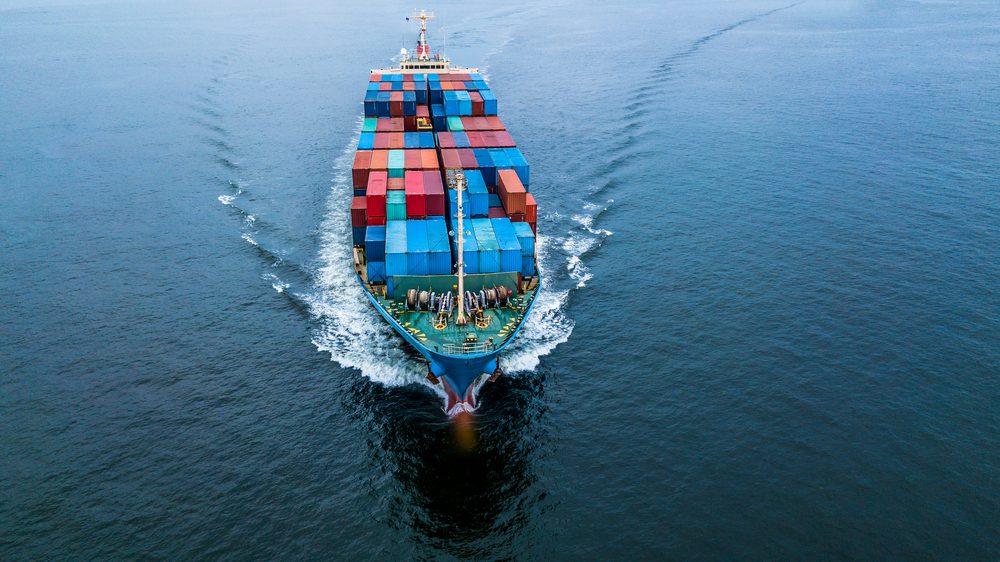Photo: Avigator Thailand / Shutterstock
By Alexander Whiteman (The Loadstar) – Container lines have objected to French calls for the IMO impose mandatory speed limits for ships.
The French proposals, submitted at the end of last month and seen by The Loadstar, call for a two-step approach of short-term measures to cut GHG emissions in shipping.
They include regulating ship speeds on a sector by sector basis, followed by the adoption of globally applicable annual emissions caps based on each ship’s output.
It is understood that Maersk has objected to the proposals, while a spokesman for Hapag-Lloyd told The Loadstar additional speed reductions “would not be a good solution”.
He said: “All container shipping lines voluntarily reduced speed a few years ago, leading to significant reductions in fuel burn, which slowed down the speed of the entire supply chain.
“We have invested many millions to technologically optimise ships accordingly, and we believe additional speed reductions are not in the interest of our customers.
“[These measures] would have a significant effect on efficiency and supply chain speed, and we would additionally need to invest again into optimising ships for lower speed.”
Data seen by The Loadstar shows that container carriers made marked improvements in cutting speed from 2008 in an era of self-regulation.
However, ships above 12,000 teu appear to have started speeding up in 2014, and one source claimed ships of all sizes across the global fleet had increased speed in the past year.
But Hapag-Lloyd’s spokesman said: “I would like to see the data; the fact is, ships have slowed down and shipping companies have invested millions to change ships accordingly.
“We should rather like to see penalisation of those companies which are not using compliant fuel and hence contribute to environmental damage.”
The German shipping giant has exceeded legal requirements on emissions and is expecting to spend a further $1bn next year to comply with the new fuel regulations.
As a whole, the industry is expecting to pay an additional $60bn annually following the implementation of the low-sulphur cap and one source said: “Carriers have no interest in speeding up as it is uneconomical, the cost element alone would cripple them.
“So, for an industry already operating on slim margins, telling it to slow-speed is like teaching a grandmother to suck eggs.”
Indeed, the 2M Alliance has announced that transit times on China-Felixstowe services would be increased from 39 to 45 days, and Maersk says it intends to be carbon-free by 2050, far beyond the 50% deduction the IMO is targeting.
In its proposals, the French specified that the plan “cannot apply to all ship type categories indifferently; in this respect, four large sets of ships can be distinguished based on the recent experience of slow-steaming”.
Among the four groups listed were ships that had not only reduced their speeds but continued to operate at lower speeds, with it specifying “containerships”.
“Since the function linking the ship’s speed and the emission level is not linear, a further speed reduction would hardly lead to any further significant emission reduction,” it said. “For those ships, France recommends to further consider the revision of the phase 3 of the EEDI standards.”
Maersk’s head of fleet technology, Ole Graa Jakobsen, told The Loadstar general speed limits did not solve the challenge of creating more energy-efficient solutions in the global fleet. He said contrary to popular belief, speed limits reduced the incentive to invest in energy-efficient ships by limiting their economic benefits.
“We believe legislation should focus on methods for speed optimisation, encouraging design of efficient new ships and investments in existing energy-efficient ships,” said Mr Jakobsen. “This would accelerate the phasing-out of inefficient ships by ensuring that they remain uneconomical to operate.
“Regulating emissions or power for an individual vessel offers a more fair and effective way to CO2 reductions.”
Mr Jakobsen’s proposals echo those called for by the Danish government, which is seeking introduction of operational efficiency metrics as opposed to speed reductions.
One environmental source said this played into Maersk’s hands as it already had the most efficient ships, the benefit of which would be lost through speed reduction measures.
“It feels if everyone went slower it would level the playing field between them and their less efficient rivals,” continued the source.
“Is the speed reduction proposal a big deal? Yes, it is probably the cheapest (cost-saving) way to cut CO2 promptly. Global warming is already impacting container shipping through more extreme and frequent weather events.
“According to the UK’s Ministry of Defence, if global warming gets out of control we are likely to see regular flooding of cities, mass crop failure, disruption of shipping routes and key choke-points such as the Panama Canal and migration on a scale of millions, in which case container shipping as a business would no longer exist in its current form anyway.”
The Loadstar is fast becoming known at the highest levels of logistics and supply chain management as one of the best sources of influential analysis and commentary.
Check them out at TheLoadstar.co.uk, or find them on Facebook and Twitter.

 Join The Club
Join The Club











